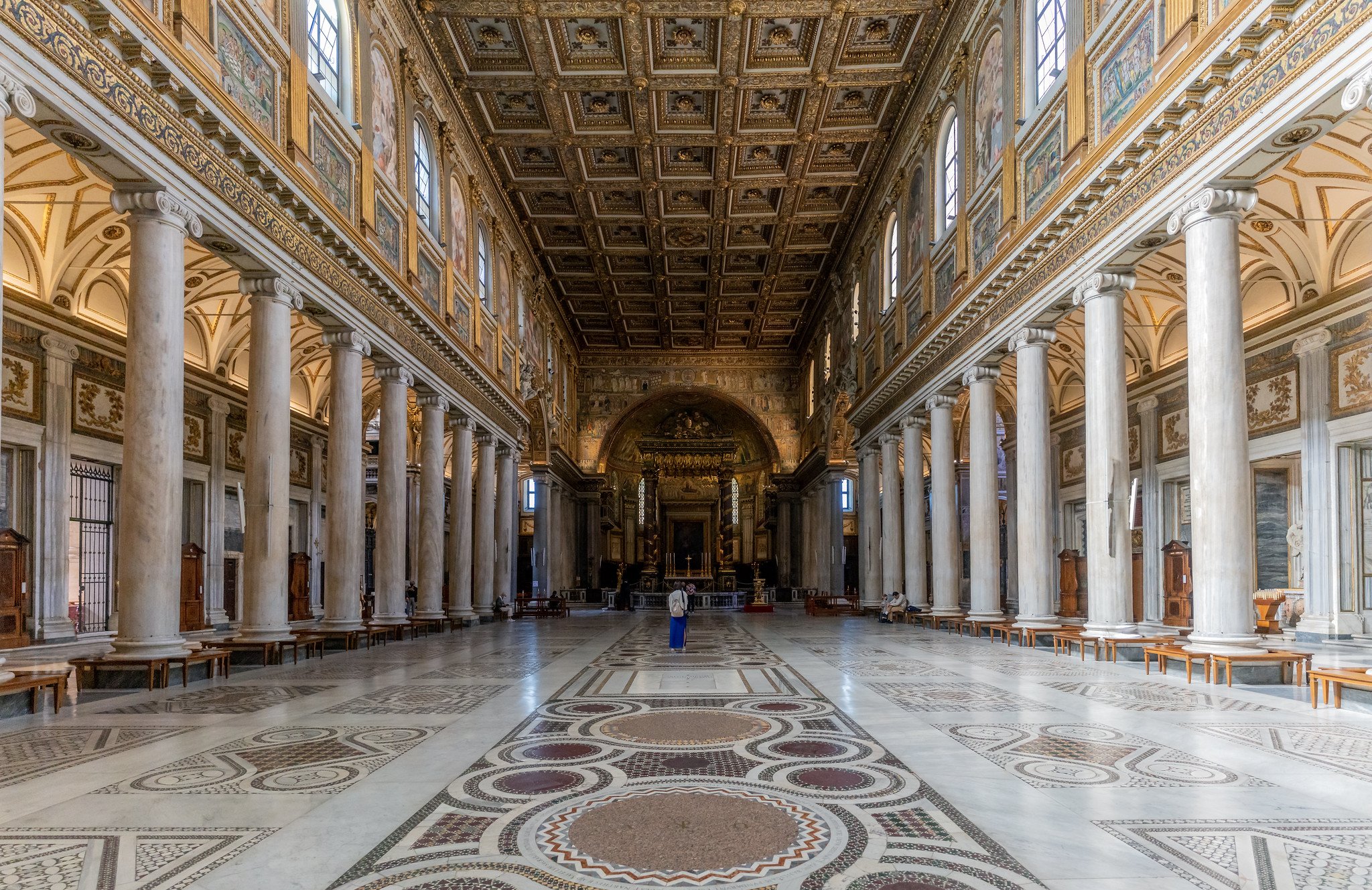January 2024 Interfaith News Roundup
by Paul Chaffee
The Interfaith News Roundup is a monthly publication of The Interfaith Observer. Paragraph by paragraph the Roundup summarizes major religion/interfaith stories that are underreported. Each paragraph is linked to the full story it introduces.
If you’d like to receive the Roundup monthly, you can sign up for our mailing list here.
Pew Research has embarked on a long-term study of spirituality, and the first results are fascinating. Seven in 10 Americans consider themselves spiritual, one way or another, including 22% who are spiritual but not religious. “An overwhelming majority of US adults (83%) say they believe that people have a soul or spirit in addition to their physical body. A smaller majority (57%) believes that animals other than humans can have their own spirits or spiritual energies.”
Worshiping Communities
Photo: Wikipedia
Approximately 2500 United Methodist congregations, 25% of the total, have left the 8-million-member United Methodist Church. At issue were policies concerning same-sex relations and ordaining LGBTQ+ individuals. Years have been consumed by these fractious arguments. Finally, the disagreements led to the largest schism in American religion.
Palestinian Christians in Gaza and elsewhere, representing a variety of denominations, are deeply disappointed that fellow Christians in the West have done so little on behalf of peace in the Middle East. In particular, the US and Europe today and in the past have failed to talk about decades of Palestinians suffering the aggressive oppression of Israeli governance growing over the years. Palestinian theologian Rev. Mitri Raheb, a Lutheran pastor in Bethlehem says, “Without justice for the Palestinians there will be no peace for Israel. Justice is at the heart of the gospel. We cannot compromise on justice. The other churches want peace without justice.”
For five millennia various occupying civilizations have praised the Cedars of Lebanon. Increasing temperatures generated by climate change are killing the beloved trees. Many thousands of square acres of forest have been reduced to 17 acres, and scientists fear that they will all be lost by the end of the century.
For the first time since 1920, leaders of the Jehovah's Witnesses have removed the hours-reporting requirement for rank-and-file adherents. For the past century, members were expected to proselytize and report to church leaders how many hours were devoted to the practice each week.
Professional organists and the mighty instruments they play have been in decline in recent years. But a younger generation of musicians is coming of age and drawn to the instruments which have accompanied so much worship in years gone by.
Government and Religion
Denmark's parliament has banned the "inappropriate treatment" of religious texts - with a bill widely known in the country as the Quran law, although it protects sacred texts from all religious traditions. The law was motivated by a series of burnings in Denmark of Islam's holy book, which led to uproar in Muslim countries. Offenders now face a fine of up to two years in jail. It passed the legislature with a 94-77 vote.
Photo: Geograph
Sikhs’ around the world are being asked to vote on the Khalistan Referendum, which proposes a new nation, located in northern India, organized and governed by Sikhs. Voting will take place in San Francisco on January 28, following votes in London, Geneva, Rome, Toronto, and Vancouver. This novel way for creating a new state is strongly opposed by the Indian government but has strong Sikh support globally. Canadian Sikh leader Hardeep Singh Nijjar, a referendum organizer, was assassinated in June, allegedly with help from the Indian government.
Speaker of the House Jim Johnson’s first speech to his colleagues in the US House of Representatives made it clear that he accepted the Speaker’s responsibilities with the firm conviction that he had been ordained by God to take the role. For years Johnson has been a firm opponent of the separation of the church and state in American government. Two years ago he said on a podcast that “The founders wanted to protect the church from an encroaching state, not the other way around,” He has written that homosexuality is inherently unnatural and could bring down democratic civilization. Clearly the election season this coming year will be a wild one.
The film “Beyond Utopia” tells the story of a pastor who has rescued more than 1,000 defectors escaping the tyranny of life in North Korea. Called the Caleb Mission, the ministry dramatizes the nightmare of living in and trying to escape totalitarianism. Its leader is Pastor Seungeun Kimm, who accompanies defectors through the jungles of Vietnam and Laos on their way to freedom.
Dressed in a white suit, Sadegh Bana Motejaded, 70, who owns a small market, stall energetically swayed and bopped. He serenaded the crowd with a folk song and encouraged others to join in with some joyous noise —helheleh kon, velveleh kon. A small group of men clapped, shouting back the rhythmic chorus, “Oh, oh, oh, oh, oh.” In cities across Iran men and women of all ages are gyrating their hips, swirling their arms in the air, and chanting the song’s catchy lines, according to videos posted on social media, television news channels like BBC Persian, and Iranians interviewed. Mr. Bana Motejaded, an Iranian, is known around town by his nickname Booghy, derived from the Persian word for megaphone. For years, he had a side gig at the soccer stadium where he carried a megaphone, walking the bleachers and energizing the fans by honking loudly. The imams ruling Iran, forbidding dancing, have tried to shut him down, but people love his dancing!
Pope Francis
Per usual, the Pope has been busy. He and the Grand Imam of Al-zhar joined other high-level religious leaders in signing an Interfaith Statement urging climate action around the world. The Interfaith Statement urgently calls on religious communities to take action on climate change. It was released at the Faith Pavilion at COP28, the 2023 United Nations Climate Change Conference.
Roman Catholic rules regarding cremation evolved this past summer. Cremation had been altogether forbidden until seven years ago. Even then permission came with the stipulation that the ashes needed to be placed in a sacred place. Last month this was liberalized to allow a portion of the ashes to be placed at a site dear to the deceased.
This change in the rules comes at the same time Francis announced that he would not be buried in the Vatican, like popes before him, but rather at Rome’s Santa Maria Maggiore, the church he visits and prays at whenever leaving on a journey overseas or returning.
The big papal story last month was Pope Francis’ approving the blessing of same-sex couples. He stipulated that such ceremonies be markedly different than wedding liturgies. In other progressive steps he has taken this past year, the pontiff said that transgender people could be baptized; and he strongly denounced laws that criminalize homosexuality. These policy shifts have earned praise from progressive Catholics and strong disapproval from conservative Catholics.
Good Interfaith, Bad Interfaith
Photo: VistaCreate
First the bad news. A far-right Polish legislator, Grzegorz Brauntook, used a fire extinguisher to douse the menorah candles lit for Hanakkah in the lobby of Poland’s parliament and was immediately asked to leave the facility. It’s a tragic story of bigotry, but a step better than murder.
Tarunjit Singh Butalia calls out the “transnational extra-judicial killings of Sikh activists abroad are also reflected in the recent rise of right-wing Hindu nationalism here in the US, not just in India.”
In Central Nigeria the violent struggle between Christians and Muslims continues. On Christmas Eve an attack on a number of Christian villages left 170 dead, more than 300 wounded, and 200 homes destroyed. At least one report suggested that the massacre was a response to the government bombing a Muslim festival on December 3, killing 130 Muslims. The government claims that bombing was accidental.
It’s not all bad news. At a time when international news gravitates towards violence and hatred, there are those at the grassroots who, while not receiving much coverage, are demonstrating the possibilities of peace at the local level. In Fresno, California, for instance, religious and civic leaders are demonstrating the possibilities of creating friendship and community in difficult times, an increasingly popular theme in churches and schools.
Six in ten in Americans say they have at least one friend who practices a different religion than they do. The interfaith movement has worked for more than a half a century to nurture friendship with people outside of one’s own religious tradition. However, only about 30% of interfaith friendships explore religious matters much.
Hosanna City of Refuge is a small Pentecostal congregation in Queens, New York. The congregation worships in their pastor’s basement. The church has an extensive program serving immigrants, largely from West Africa and Venezuela. It hosts Muslim prayers five times a day, an example of Hosanna City of Refuge’s migrant ministry. Rev. Phillip Falayi, their pastor, is frank about why serving Muslim immigrants is important: “They are Muslim. Our intention is to assist them, not convert them. Just because I’m a pastor and you live in my house doesn’t mean you have to do what I’m doing in terms of faith.”
Interfaith America, the burgeoning interfaith group that used to be the Interfaith Youth Core, has announced a new effort at tracking and taking advantage of the relationship between health and faith. “At Interfaith America, we’re building communities of practice committed to unlocking the positive potential of religion in health-related settings. From undergraduate and graduate health professions programs to health-focused faith-based organizations to health system and public health leaders, we’re inspiring, equipping, and connecting those who are poised to bridge the gap between religion and health to promote individual and community flourishing.” Now that’s good news!
Header Photo: Unsplash





